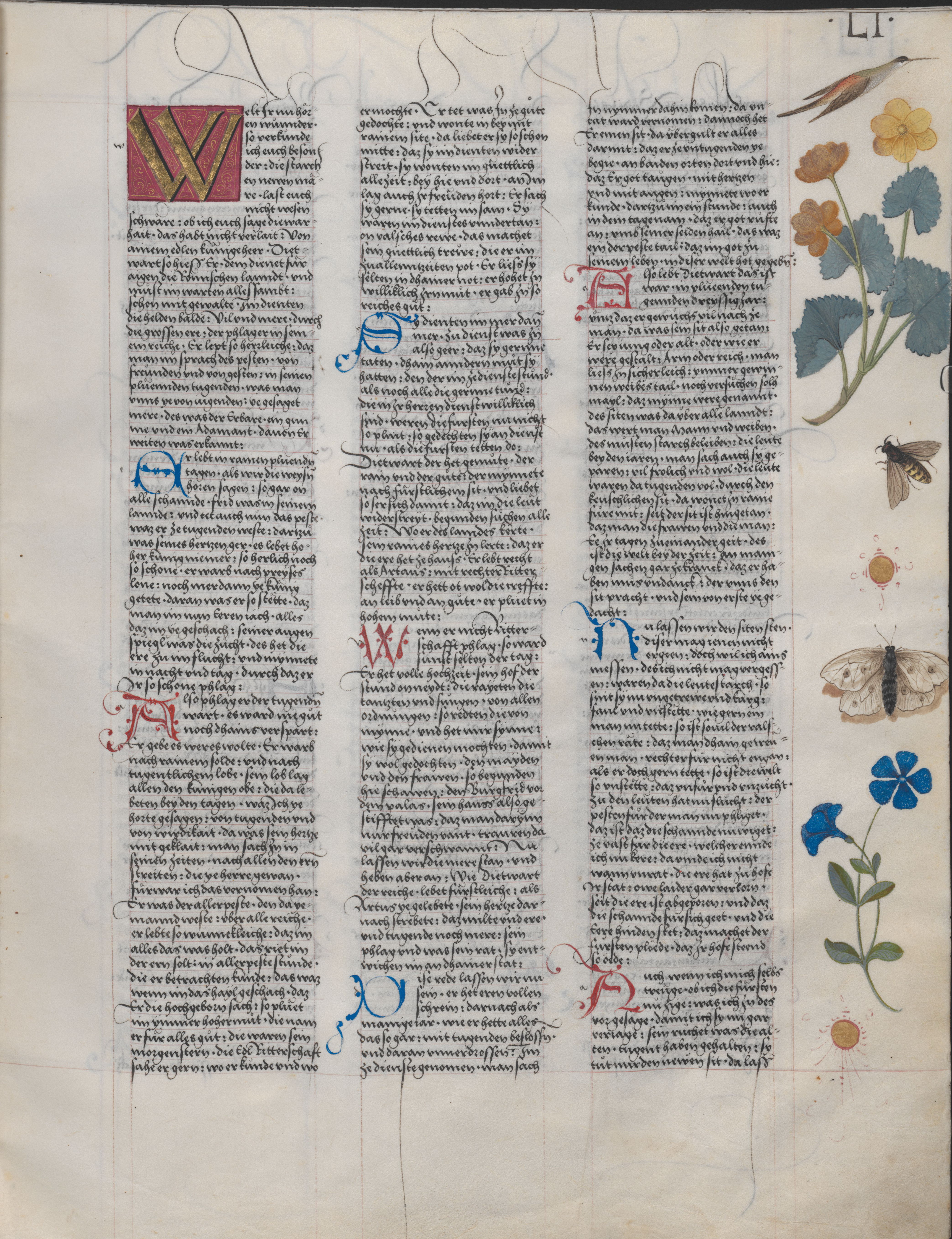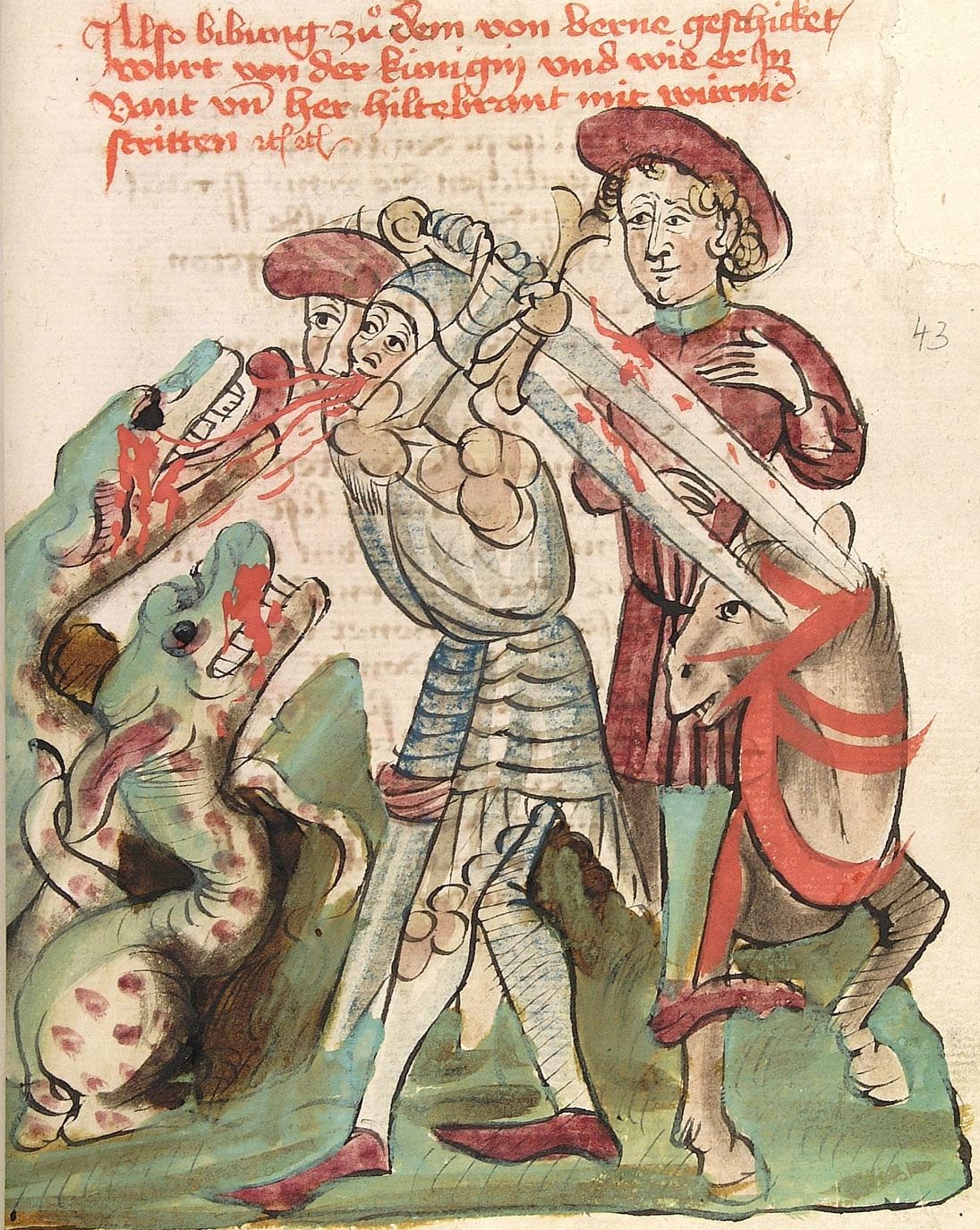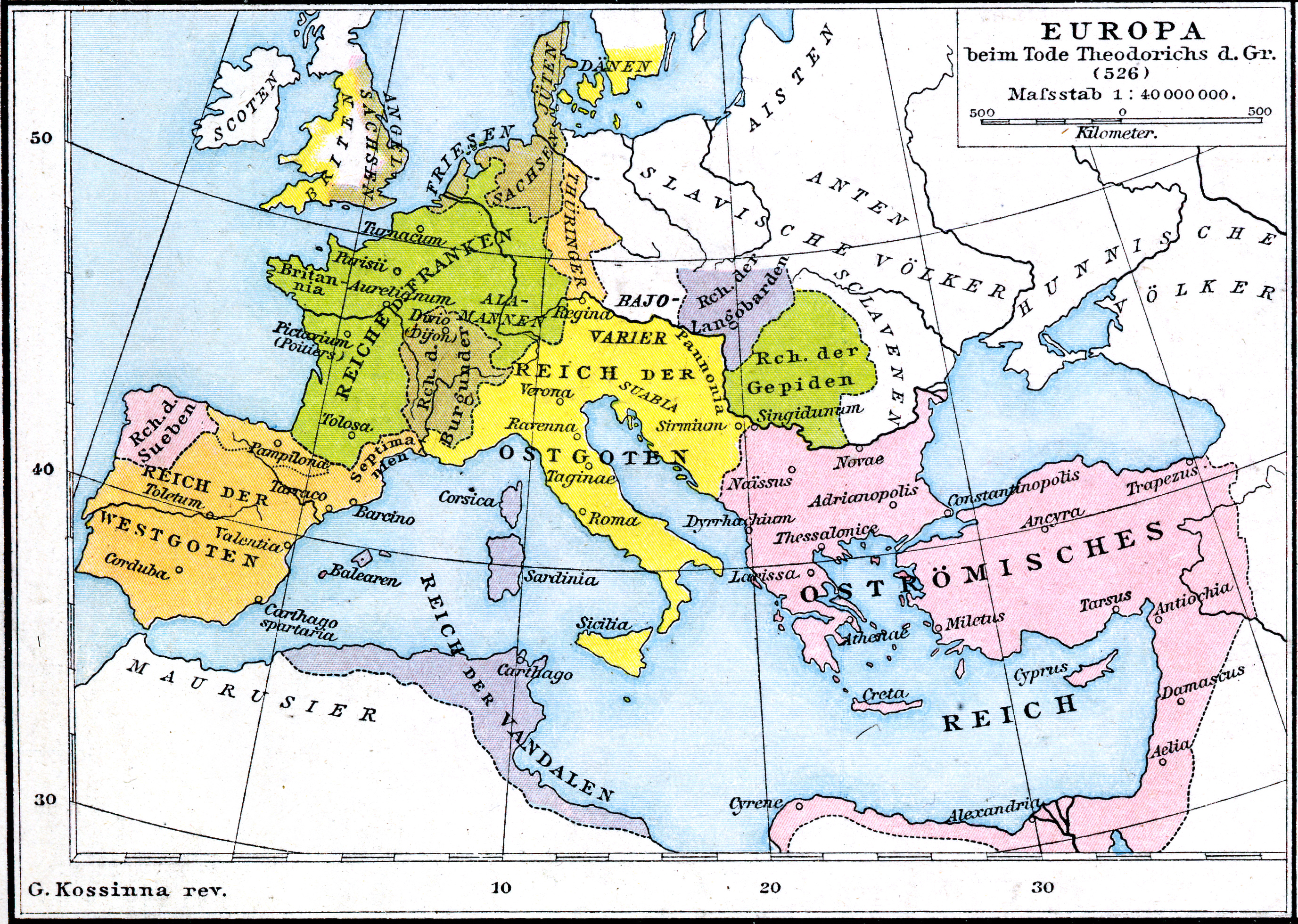|
Alphart
''Alpharts Tod'' (The Death of Alphart) is an anonymous late medieval Middle High German poem in the poetic cycle of the hero Dietrich von Bern, the counterpart of the historical Ostrogothic king Theodoric the Great in Germanic heroic legend. It is part of the so-called "historical" Dietrich material. It may have written as early as between 1245 and 1300, but it is only transmitted in a single manuscript from around 1470 or 1480. The place of composition is unknown. ''Alpharts Tod'' concerns the young hero Alphart, one of Dietrich's heroes and the nephew of Hildebrand, at the start of a war between Dietrich and his uncle Ermanaric, Ermenrich. Alphart insists on riding out alone, and while he is brave and a powerful warrior, he eventually encounters Witege and Heime, two traitors who have switched sides to Ermenrich. They kill him in a dishonorable fashion; Ermenrich, meanwhile, fails to defeat Dietrich. Summary The beginning of the epic is missing. Emperor Emenrich tells Heime to ... [...More Info...] [...Related Items...] OR: [Wikipedia] [Google] [Baidu] |
ALPHART
''Alpharts Tod'' (The Death of Alphart) is an anonymous late medieval Middle High German poem in the poetic cycle of the hero Dietrich von Bern, the counterpart of the historical Ostrogothic king Theodoric the Great in Germanic heroic legend. It is part of the so-called "historical" Dietrich material. It may have written as early as between 1245 and 1300, but it is only transmitted in a single manuscript from around 1470 or 1480. The place of composition is unknown. ''Alpharts Tod'' concerns the young hero Alphart, one of Dietrich's heroes and the nephew of Hildebrand, at the start of a war between Dietrich and his uncle Ermanaric, Ermenrich. Alphart insists on riding out alone, and while he is brave and a powerful warrior, he eventually encounters Witege and Heime, two traitors who have switched sides to Ermenrich. They kill him in a dishonorable fashion; Ermenrich, meanwhile, fails to defeat Dietrich. Summary The beginning of the epic is missing. Emperor Emenrich tells Heime to ... [...More Info...] [...Related Items...] OR: [Wikipedia] [Google] [Baidu] |
Witege
Witege, Witige or Wittich ( ang, Wudga, Widia; Gotho- lat, Vidigoia) or Vidrik "Vidga" Verlandsson ( + ''Viðga'' or ''Videke'' + ''Verlandsson'', ''Vallandsson'', or ''Villandsson'') is a character in several Germanic heroic legends, poems about Dietrich von Bern, and later Scandinavian ballads.The article Vidrik Verlandsson' in ''Nordisk familjebok'' (1921). In German legends, he was one of the warriors of Dietrich von Bern, but betrayed him and took instead the side of his wicked Uncle Ermenrich. In one of the Scandinavian ballads (TSB E 119), he won particular fame in his duel with Langben Rese/Risker (the giant Etgeir in the '' Þiðrekssaga''). During the Middle Ages, he became the son of Wayland the Smith and Böðvildr, and this entitled him to carry a hammer and tongs in his coat of arms. Later the origin of his name "Wayland's son" was forgotten, but the fame of the character prevailed. During the 16th and the 17th centuries, this led to the idea that his name " ... [...More Info...] [...Related Items...] OR: [Wikipedia] [Google] [Baidu] |
Heime
Heime (German), Háma ( ang, Hāma), or Heimir (Old Norse) was a Germanic figure in Germanic heroic legend who often appears together with his friend Witige.The article Heimer' in ''Nordisk familjebok'' (1909). He appears in the Anglo-Saxon poems ''Beowulf'' and ''Widsith'', in the Scandinavian '' Þiðrekssaga'' and in German epics such as ''Alpharts Tod''.The entry ''Heime/Heimir'' in ''The Nibelungen Tradition: An Encyclopedia'' (2002) by Francis G. Gentry. p. 84 Origins Since Wudga is based on a Gothic hero named Vidigoia, it is possible that Hama has a similar origin, and the Anglo-Saxon poem ''Widsith'' talks of Hama and Wudga as Gothic warriors fighting against the Huns in the Vistula forests, where the Goths had an early settlement. Later, during the evolution of the legends, the two heroes were connected with both the Gothic kings Ermanaric and Theodoric the Great, and they were increasingly presented as traitors; it is as traitors that they appear in the '' Þiðrekssag ... [...More Info...] [...Related Items...] OR: [Wikipedia] [Google] [Baidu] |
Dietrichs Flucht
''Dietrichs Flucht'' (Dietrich's Flight) or ''Das Buch von Bern'' (The Book of Verona) is an anonymous 13th-century Middle High German poem about the legendary hero Dietrich von Bern, the legendary counterpart of the historical Ostrogothic king Theodoric the Great in Germanic heroic legend. It is part of the so-called "historical" Dietrich material and is closely related to, and always transmitted together with, a second Dietrich poem, the ''Rabenschlacht''. A Heinrich der Vogler is named as author in an excursus of the poem. Earlier scholarship considered him to be the author of ''Dietrichs Flucht'' and possibly also of the ''Rabenschlacht'', however more recent scholarship believes he is only author of this excursus. ''Dietrichs Flucht'' describes the rule of Dietrich's ancestors in his kingdom in northern Italy; his betrayal and exile by his wicked uncle Ermenrich, and his flight to the Huns, where he is warmly received by Etzel and his wife Helche. With Etzel's help, Dietri ... [...More Info...] [...Related Items...] OR: [Wikipedia] [Google] [Baidu] |
Dietrich Von Bern
Dietrich von Bern is the name of a character in Germanic heroic legend who originated as a legendary version of the Ostrogothic king Theodoric the Great. The name "Dietrich", meaning "Ruler of the People", is a form of the Germanic name "Theodoric". In the legends, Dietrich is a king ruling from Verona (Bern) who was forced into exile with the Huns under Etzel by his evil uncle Ermenrich. The differences between the known life of Theodoric and the picture of Dietrich in the surviving legends are usually attributed to a long-standing oral tradition that continued into the sixteenth century. Most notably, Theodoric was an invader rather than the rightful king of Italy and was born shortly after the death of Attila and a hundred years after the death of the historical Gothic king Ermanaric. Differences between Dietrich and Theodoric were already noted in the Early Middle Ages and led to a long-standing criticism of the oral tradition as false. Legends about Theodoric may have exi ... [...More Info...] [...Related Items...] OR: [Wikipedia] [Google] [Baidu] |
Rosengarten Zu Worms
Dietrich and Siegfried from a 15th-century manuscript of the ''Rosengarten zu Worms'' ''Der Rosengarten zu Worms'' (the rose garden at Worms), sometimes called ''Der große Rosengarten'' (the big rose garden) to differentiate it from ''Der kleine Rosengarten'' ( ''Laurin''), and often simply called the ''Rosengarten'', is an anonymous thirteenth-century Middle High German heroic poem in the cycle of Dietrich von Bern. The ''Rosengarten'' may have been written as early as before 1250, but is securely attested by around 1300. It is unclear where it was written. While it combines characters from the traditions of the ''Nibelungenlied'', Walter of Aquitaine, and the Dietrich cycle, the ''Rosengarten'' is usually considered one of the so-called fantastical (''aventiurehaft'') poems about Dietrich: these poems more closely resembles a courtly romance than traditional heroic epic. Occasionally, because it features Dietrich fighting against human opponents rather than giants or dwarfs, i ... [...More Info...] [...Related Items...] OR: [Wikipedia] [Google] [Baidu] |
Rabenschlacht
''Die Rabenschlacht'' (The Battle of Ravenna) is an anonymous 13th-century Middle High German poem about the hero Dietrich von Bern, the counterpart of the historical Ostrogothic king Theodoric the Great in Germanic heroic legend. It is part of the so-called "historical" Dietrich material and is closely related to, and always transmitted together with, a second Dietrich poem, ''Dietrichs Flucht''. At one time, both poems were thought to have the same author, possibly a certain Heinrich der Vogler, but stylistic differences have led more recent scholarship to abandon this idea. ''Die Rabenschlacht'' concerns a failed attempt by the exiled Dietrich to reclaim his kingdom in Northern Italy from his treacherous uncle Ermenrich, with the help of an army provided by Etzel, king of the Huns. In the course of this attempt, Dietrich's younger brother and Etzel's young sons by his wife Helche are killed by Dietrich's former vassal Witege outside of Ravenna. Witege then flees into the sea ... [...More Info...] [...Related Items...] OR: [Wikipedia] [Google] [Baidu] |
Ermanaric
Ermanaric; la, Ermanaricus or ''Hermanaricus''; ang, Eormanrīc ; on, Jǫrmunrekkr , gmh, Ermenrîch (died 376) was a Greuthungian Gothic king who before the Hunnic invasion evidently ruled a sizable portion of Oium, the part of Scythia inhabited by the Goths at the time. He is mentioned in two Roman sources: the contemporary writings of Ammianus Marcellinus, and in ''Getica'' by the sixth-century historian Jordanes. He also appears in a fictionalized form in later Germanic heroic legends. Modern historians disagree on the size of Ermanaric's realm. Herwig Wolfram postulates that he at one point ruled a realm stretching from the Baltic Sea to the Black Sea as far eastwards as the Ural Mountains. Peter Heather is skeptical of the claim that Ermanaric ruled all Goths except the Tervingi, and furthermore points to the fact that such an enormous empire would have been larger than any known Gothic political unit, that it would have left bigger traces in the sources and that t ... [...More Info...] [...Related Items...] OR: [Wikipedia] [Google] [Baidu] |
Germanic Heroic Legend
Germanic heroic legend (german: germanische Heldensage) is the heroic literary tradition of the Germanic-speaking peoples, most of which originates or is set in the Migration Period (4th-6th centuries AD). Stories from this time period, to which others were added later, were transmitted orally, traveled widely among the Germanic speaking peoples, and were known in many variants. These legends typically reworked historical events or personages in the manner of oral poetry, forming a heroic age. Heroes in these legends often display a heroic ethos emphasizing honor, glory, and loyalty above other concerns. Like Germanic mythology, heroic legend is a genre of Germanic folklore. Heroic legends are attested in Anglo-Saxon England, medieval Scandinavia, and medieval Germany. Many take the form of Germanic heroic poetry (german: germanische Heldendichtung): shorter pieces are known as heroic lays, whereas longer pieces are called Germanic heroic epic (). The early Middle Ages preser ... [...More Info...] [...Related Items...] OR: [Wikipedia] [Google] [Baidu] |
Theodoric The Great
Theodoric (or Theoderic) the Great (454 – 30 August 526), also called Theodoric the Amal ( got, , *Þiudareiks; Greek: , romanized: ; Latin: ), was king of the Ostrogoths (471–526), and ruler of the independent Ostrogothic Kingdom of Italy between 493 and 526, regent of the Visigoths (511–526), and a patrician of the Eastern Roman Empire. As ruler of the combined Gothic realms, Theodoric controlled an empire stretching from the Atlantic Ocean to the Adriatic Sea. Though Theodoric himself only used the title 'king' (''rex''), some scholars characterize him as a Western Roman Emperor in all but name, since he ruled large parts of the former Western Roman Empire, had received the former Western imperial regalia from Constantinople in 497, and was referred to by the title ''augustus'' by some of his subjects. As a young child of an Ostrogothic nobleman, Theodoric was taken as a hostage to Constantinople, where he spent his formative years and received an East Roman education (' ... [...More Info...] [...Related Items...] OR: [Wikipedia] [Google] [Baidu] |
Aristeia
An aristeia or aristia (; grc, ἀριστεία , ''"excellence"'') is a scene in the dramatic conventions of epic poetry as in the ''Iliad'', where a hero in battle has his finest moments (''aristos'' = "best"). ''Aristeia'' may result in the death of the hero, and therefore suggests a "battle in which he reaches his peak as a fighter and hero". Historical background In the pre-hoplite phase of Greek military evolution, the well-armed aristocrat was the major focus of military action, placed at the apex of his less well-armed dependants. This was reflected in the Homeric division between nobility and commoners, and in the regular epic struggles over the armour of the former, once fallen in their aristeia. Classical hoplite armies, though very different, nevertheless still awarded prizes (aristeia) for individual excellence in action. Epic examples Literally, "moment of excellence", ''aristeiai'' often coincide with battleground slaughter, and feature one warrior who dominates t ... [...More Info...] [...Related Items...] OR: [Wikipedia] [Google] [Baidu] |
German Heroic Legends
German(s) may refer to: * Germany (of or related to) **Germania (historical use) * Germans, citizens of Germany, people of German ancestry, or native speakers of the German language ** For citizens of Germany, see also German nationality law **Germanic peoples (Roman times) * German language **any of the Germanic languages * German cuisine, traditional foods of Germany People * German (given name) * German (surname) * Germán, a Spanish name Places * German (parish), Isle of Man * German, Albania, or Gërmej * German, Bulgaria * German, Iran * German, North Macedonia * German, New York, U.S. * Agios Germanos, Greece Other uses * German (mythology), a South Slavic mythological being * Germans (band), a Canadian rock band * "German" (song), a 2019 song by No Money Enterprise * ''The German'', a 2008 short film * "The Germans", an episode of ''Fawlty Towers'' * ''The German'', a nickname for Congolese rebel André Kisase Ngandu See also * Germanic (other) * Germa ... [...More Info...] [...Related Items...] OR: [Wikipedia] [Google] [Baidu] |








